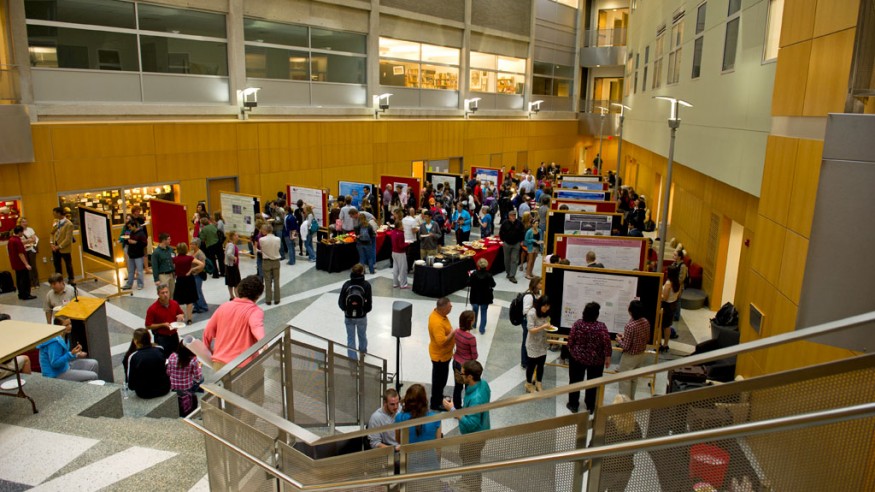
Patricia Belt Conrades Summer Science Research Symposium Showcases OWU Talent
Students present research results at the The Patricia Belt Conrades Summer Science Research Symposium, the capstone of OWU’s Summer Science Research Program. (Photo by Paul Molitor)
The atrium of the Schimmel/Conrades Science Center was packed Monday afternoon as participants in the Patricia Belt Conrades Summer Science Research Symposium presented the results of the work they did during OWU’s 10-week Summer Science Research Program.
Members of the Ohio Wesleyan community, along with nearly 40 high school students and their families attending the Consider Science visit program, roamed from poster to poster, asking the researchers about their projects.
The air was alive with excitement as OWU students shared the joys of a summer of discovery.
One group of students worked with Professor of Chemistry Kim Lance, Ph.D., continuing research initiated by other students during the past several years.
Using green chemistry techniques, the Lance Lab is searching for catalysts that will purify water without the need for environmentally unfriendly chemicals such as chlorine.
“What I do as a synthetic chemist,” Lance says, “is to try to manipulate nature. Much of science is about observing and recording, and we do that, too. We model observations, but we also are trying make molecules do what they don’t do in nature.”
“We have to take incremental steps to get there,” he continues, “and sometimes nature barks back. It’s like following a hiking trail. Oftentimes the road is nicely paved and well-worn, and you think you know where it will lead you. Instead of reaching the end of the trail, however, you find yourself face to face with a big tree. You have to go back to the beginning of the trail and begin again, taking another path.” Sometimes the experimentation can be heartbreaking.
“In one of our experiments this summer,” Lance says, “Mother Nature said ‘no’ in a big way, but it was useful because it proved that not only did this particular synthetic pathway not work, but also that it couldn’t work. I told the students they had 24 hours to mope about it, but then they had to get busy again. Now they’re back on the same trail, and the molecules they’re making have never been made before, at least to our knowledge.”
In research, Lance says, no one gives you a roadmap. It’s all about creative thinking. “I’m here to teach students how to think, not what to think,” he says. “I teach concepts, not how to memorize, regurgitate, and spit. My Number One job is to train scientists in how to do science.”
(Photo by Paul Molitor)(Photo by Paul Molitor)(Photo by Paul Molitor)(Photo by Paul Molitor)